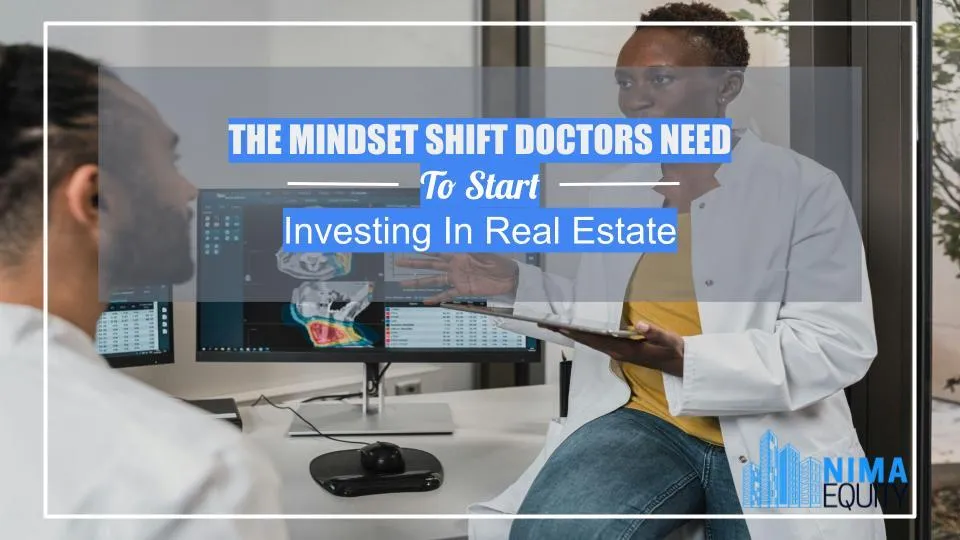
The Mindset Shift Doctors Need To Start Investing In Real Estate
Physicians are among the highest-earning professionals, yet many still rely on their monthly income. For years, the standard advice has been to invest in traditional avenues like stocks, mutual funds, or retirement accounts. While these are valid strategies, they aren't the only path to financial security.
The idea of investing in real estate often feels unfamiliar or even risky to many doctors. The hesitation isn’t just about money—it’s about mindset. Shifting your perspective to embrace real estate investing can open doors to passive income, wealth-building, and ultimately, more freedom in your life.
Why Financial Education Beyond Wall Street Matters
Physicians are highly educated, but financial literacy is rarely part of their training. From medical school to residency, the focus is on patient care, not personal wealth. As a result, many doctors default to traditional financial advice that focuses on Wall Street investments.
Wall Street investments refer to financial assets such as stocks, bonds, mutual funds, and exchange-traded funds (ETFs) traded through the stock market. These are some of the most traditional and widely used options for growing wealth.
While these options are valuable, they have limitations. Market volatility, high management fees, and limited tax benefits can erode returns. Real estate, on the other hand, offers opportunities for passive income, diversification, and significant tax advantages, such as depreciation and 1031 exchanges.
The problem is that most physicians don’t know where to start. The world of real estate can feel overwhelming and unfamiliar.
Overcoming the Fear of Risk
Risk feels uncomfortable, especially for physicians who are trained to minimize errors and protect lives. This cautious mindset often spills over into personal finances, making real estate seem too risky or unpredictable.
However, the truth is that every investment carries some level of risk. The key isn’t to avoid risk altogether—it’s to manage it wisely. In real estate, this means:
Conducting Due Diligence - Research markets thoroughly, understand the property’s financials, and vet investment partners.
Starting Small - If managing a property feels overwhelming, consider starting with real estate investment trusts (REITs) or syndications. These options allow you to invest without the hassle of property management.
Diversifying - To reduce risk, it's important to spread your money across different types of investments, like houses, apartment buildings, or business properties. This way, if one area struggles, your other investments can help protect you.
The Power of a Growth Mindset
Investing in real estate requires a mindset that includes learning and adaptability. A growth mindset is the belief that skills and knowledge can be developed through effort and persistence.
For physicians, adopting this mindset is especially powerful because you’ve already mastered complex skills through years of training, and real estate investing is no different. With the right mindset, you can learn from challenges—if an investment doesn’t go as planned, treat it as a lesson rather than a failure. Additionally, staying adaptable is crucial since the real estate market, like medicine, evolves over time. Remaining curious and open to new strategies will ensure long-term success.
To build this mindset, start small by reading a beginner’s guide to real estate investing, attending a local seminar, or joining an investment club. Surrounding yourself with supportive, like-minded people can make a big difference as you take your first steps in real estate investing.
How a Mindset Shift Can Reduce Burnout
Physician burnout is a growing problem. Long hours, high stress, and constant pressure can leave you physically and emotionally drained. One of the biggest contributors to burnout is financial dependence on medicine.
Real estate offers a way out. By generating passive income, real estate can provide financial stability without requiring you to work extra shifts or see more patients. Over time, this can allow you to reduce your workload or even take a break to focus on your well-being.
Real estate also provides a sense of purpose outside of medicine. Many physicians find fulfillment in building wealth for their families or contributing to communities through housing improvements.
Starting small is key. You don’t need to buy a 100-unit apartment complex on your first day. Begin with a rental property or participate in a syndication where you partner with experienced investors. As your portfolio grows, so will your income—and your options for a more balanced life.
Investing in real estate isn’t just about money—it’s about creating a life where you have control over your time, energy, and resources. Shifting your mindset is the first step. Instead of viewing real estate as risky or unachievable, start seeing it as a skill you can learn.
Real estate isn’t a one-size-fits-all solution, but it’s a reliable tool for those willing to embrace it. As a physician, you’ve already shown the discipline and commitment needed to succeed. Apply that same mindset to investing, and you’ll be on your way to financial freedom.
